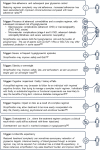Expert Panel Guidance and Narrative Review of Treatment Simplification of Complex Insulin Regimens to Improve Outcomes in Type 2 Diabetes
- PMID: 35274219
- PMCID: PMC8913205
- DOI: 10.1007/s13300-022-01222-2
Expert Panel Guidance and Narrative Review of Treatment Simplification of Complex Insulin Regimens to Improve Outcomes in Type 2 Diabetes
Abstract
Given the progressive nature of type 2 diabetes (T2D), most individuals with the disease will ultimately undergo treatment intensification. This usually involves the stepwise addition of a new glucose-lowering agent or switching to a more complex insulin regimen. However, complex treatment regimens can result in an increased risk of hypoglycaemia and high treatment burden, which may impact negatively on both therapeutic adherence and overall quality of life. Individuals with good glycaemic control may also be overtreated with unnecessarily complex regimens. Treatment simplification aims to reduce individual treatment burden, without compromising therapeutic effectiveness or safety. Despite data showing that simplifying therapy can achieve good glycaemic control without negatively impacting on treatment efficacy or safety, it is not always implemented in clinical practice. Current clinical guidelines focus on treatment intensification, rather than simplification. Where simplification is recommended, clear guidance is lacking and mostly focused on treatment of the elderly. An expert, multidisciplinary panel evaluated the current treatment landscape with respect to guidance, published evidence, recommendations and approaches regarding simplification of complex insulin regimens. This article outlines the benefits of treatment simplification and provides practical recommendations on simplifying complex insulin treatment strategies in people with T2D using illustrative cases.
Keywords: Antidiabetic drug; Glycaemic control; Insulin therapy; Primary care; Type 2 diabetes.
© 2022. The Author(s).
Figures
References
-
- American Diabetes Association, 9. Pharmacologic Approaches to Glycemic Treatment: Standards of Medical Care in Diabetes—2021. Diabetes Care. 2021;44(Supplement 1):S111. - PubMed
-
- Giugliano D, et al. Beyond basal-bolus insulin regimen: is it still the ultimate chance for therapy in diabetes? Diabetes Res Clin Pract. 2019;157:107922. - PubMed


